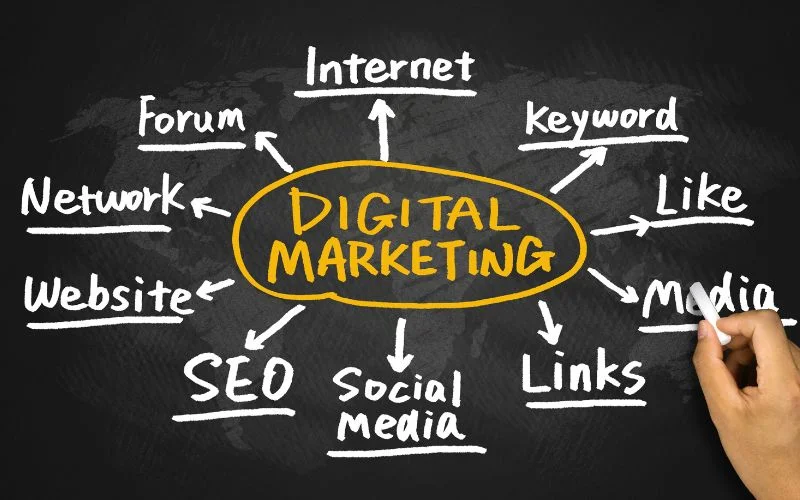Digital marketing has completely changed the way companies interact with their customers. The marketing landscape has changed from traditional tactics to digital platforms due to the widespread use of the internet. This shift includes a number of tactics, like as social media marketing, SEO, and Pay-Per-Click (PPC) advertising, all of which are vital for promoting the expansion of businesses.
Digital Marketing: Its Fundamentals
Optimizing for Search Engines (SEO)
PPC (Pay Per Click) Advertising
Marketing on Social Media
The Importance of Analytics
Challenges and Future Trends
The use of digital platforms to market and promote goods and services to customers and businesses is known as "digital marketing." It entails using digital channels including search engines, social media, email, and websites to connect with prospective clients. The aim is to use a variety of digital tools and strategies to engage, inform, and turn leads into devoted consumers.
One essential component of digital marketing is SEO. It entails improving a website’s position in search engine results pages (SERPs) in order to attract more organic or non-paid visitors. Researching keywords, producing content, and optimizing both the page and the off page are all effective SEO strategies. By focusing on pertinent keywords and producing material of superior quality, companies can raise their profile and draw in more customers.
In SEO, keywords are very important. Selecting and using the appropriate keywords in website content aids search engines in determining the page’s relevancy to particular queries. As a result, the website’s ranking rises, making it simpler for prospective clients to find the company online.
With PPC digital marketing, advertisers pay a fee each time their advertisement is displayed. PPC has a number of benefits, such as budget control, exact targeting, and quick results. Advertisers have the ability to specify several aspects of their adverts, including time of day, location, and demographics. By displaying the advertising to a highly relevant audience, this level of control maximizes the likelihood of conversion.
Social media marketing uses sites like LinkedIn, Instagram, Twitter, and Facebook to advertise goods and services. Using this tactic, material is produced and disseminated according to the preferences and actions of the intended audience. Social media marketing is more than just updating your audience; it also entails interacting with them, developing connections, and creating a sense of community around your business.
Reaching a large and varied audience is one of social media marketing’s main advantages. With billions of consumers across several platforms, companies can interact personally with prospective clients. Through analytics, social media also offers useful insights that assist marketers determine what material appeals to their target audience and modify their approach accordingly.
Combining Digital and Traditional Marketing Techniques The integration of many techniques is where digital marketing really shines. Social media marketing, PPC, and SEO shouldn’t work in isolation. Rather, they ought to enhance one another in order to produce a holistic and unified marketing strategy.
In the early phases of a campaign, PPC can be used to draw instant attention and increase traffic, whereas SEO concentrates on generating organic traffic. In the interim, social media marketing can be used to interact with the public and develop leads that are produced by PPC and SEO campaigns. This coordinated strategy optimizes conversion chances while guaranteeing a consistent stream of traffic.
Analytics is the backbone of digital marketing. It involves collecting, measuring, and analyzing data to understand user behavior and campaign performance. Tools like Google Analytics provide insights into website traffic, user demographics, and conversion rates. This data is crucial for making informed decisions and optimizing marketing strategies.
By analyzing the performance of SEO, PPC, and social media marketing campaigns, businesses can identify what works and what doesn’t. This continuous process of monitoring and adjusting ensures that marketing efforts are effective and aligned with business goals.
Despite its advantages, digital marketing comes with its own set of challenges. Privacy concerns and data security are also significant issues. With increasing regulations like the General Data Protection Regulation (GDPR), businesses must ensure they handle customer data responsibly and transparently.
Looking ahead, several trends are likely to shape the future of digital marketing. Artificial intelligence (AI) and machine learning are set to play a pivotal role in automating and optimizing marketing efforts. Personalization will become even more crucial, with marketers leveraging data to deliver highly tailored experiences. Additionally, the rise of voice search and the growing importance of mobile-first strategies will continue to influence how businesses approach digital marketing.
Conclusion
In conclusion, digital marketing is an amazing upgrowing tool for modern businesses to grow in the market. SEO, PPC, and social media marketing each offer unique benefits and, when integrated, create a powerful strategy for reaching and engaging with potential customers. By staying informed about the latest trends and continually optimizing their efforts through analytics, businesses can navigate the dynamic digital landscape and achieve sustained growth. The future of digital marketing is bright, promising even more innovative ways to connect with audiences and drive success in the digital age.
Unlock your potential with Crazyonweb, the leading digital marketing institute. Whether you’re looking for comprehensive digital marketing training or SEO training, our expert-led courses are designed to equip you with the skills you need to thrive. As a top digital marketing company, we offer hands-on experience and a digital marketing certification that sets you apart. Join Crazyonweb and transform your career with the best digital marketing and SEO company.





